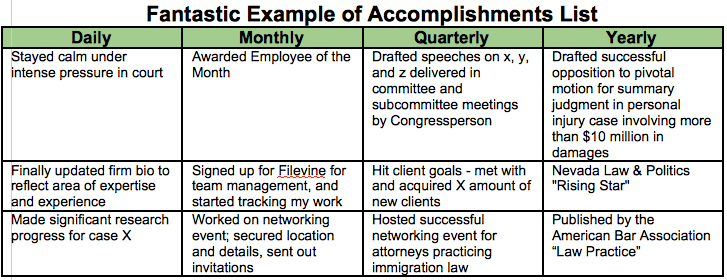We spend a lot of time figuring out how to be more productive, how to organize our personal and work lives, and how we can complete our to-do list faster and more efficiently. We work hard, and by the end of the day, most of us are tired and ready to go home. We think about our day, stress about what we didn’t get done, and probably think about everything we have to finish tomorrow. We sigh, pack up, turn off the lights, and head home.
Even if our day went well, most of us don’t celebrate our accomplishments. In fact, sometimes the more productive we are, the more likely we are to feel guilty and beat ourselves up about not doing enough. Daily, monthly, and even yearly, we mentally trap ourselves by perpetually thinking we haven’t done enough.
How can we end this stressful cycle? How can we regularly celebrate our victories, big and small? Make an accomplishments list. At the end of every work day, at the end of each month and each year, take the time to reflect and write down 5-10 accomplishments. Trust us, it’s worth it.
Why Make A List?
Reduce stress. Experts have determined that while stress can serve as a productive stimulant, it’s terrible on our health, to the point where we can develop an unhealthy neurochemical dependence on it. Stress is a drug that the Center for Disease Control and Prevention says contributes to 90% of all medical visits. Fortunately, a study from the University of Minnesota tells us that writing down our accomplishments and positive thoughts at the end of our day reduces our stress levels.
Increase optimism, happiness, boost self-worth, decrease dependence on outside forces. York University researchers, Dr. Myriam Mongrain and graduate student Susan Sergeant in Toronto, asked 466 people to participate in an optimism experient. Participants ages 18-80 were asked to take ten minutes to write down accomplishments from their day, and the results were revealing. “Those who participated in the exercise developed a more adaptive set of beliefs about their self-worth. They became less dependent on others to feel good about themselves,” says Mongrain. After multiple studies, happiness researchers (yes, there is such a thing), suggest that writing at least three positive accomplishments down from our day is one of the best ways to encourage long term happiness.
Higher work performance. Writing down your accomplishments and reflecting on them has been proven to raise your performance level, and can help you qualify and assess your strengths. It’s also a great confidence builder. Harvard professor and director of research, Teresa Amabile, believes that feeling a sense of progress has a huge, positive impact on engagement and motivation. In her latest research, she found that those who recorded at least three sentences about their daily accomplishments felt more productive, competent and effective at work.
Take your career to the next level. Keeping and using an accomplishments list helps you campaign for promotions and raises and prepare for meetings and performance reviews. Adding accomplishments to your resume increases your likelihood of finding a job. Not only can you turn your duties into accomplishments, but senior vice president of Google’s hiring team Laszlo Bock emphasizes that listing accomplishments is one of the most important aspects of a resume. “The key is to frame your strengths as: ‘I accomplished X, relative to Y, by doing Z.”
Get To It! How To Write An Accomplishments List
Focus on progress, not projects or productivity, and recognize that small accomplishments can be triumphs
Start out with a daily list. Grab a notebook and choose a consistent place and time toward the end of the day to help you build the habit (you can even it add it to your calendar). Make sure you won’t be disturbed, take 5-10 minutes to reflect on the day, and write down 3-5 things you accomplished. Focus on progress, not projects or productivity, and recognize that small accomplishments can be triumphs. Include what you’re proud of, what you loved doing, a challenge you faced or problem, actions you took and the outcomes. You can start out with short, brief accomplishments and move on to include details. It’s helpful to be detailed and use quantifiable and measurable results.
Don’t include every single thing you did during the day, or busywork. Surprisingly, being busy is not an accomplishment. It may feel great in the moment, but do you really want to remember that you spent four hours on emails and cleared your inbox? Or two hours finishing billing for your clients?
Once you have your daily writing habit down, move on to monthly, quarterly, and yearly lists. Each one might look different; days will have smaller accomplishments, months and quarters will have larger accomplishments that are more likely to reflect projects and goals, and yearly lists should include long-term career accomplishments. Check out our examples below.


Building the habit of writing down your accomplishments isn’t hard. In fact, on top of the litany of the benefits listed above, it’s actually fun. Get started today, and leave work feeling fantastic about your accomplishments. Everyday.